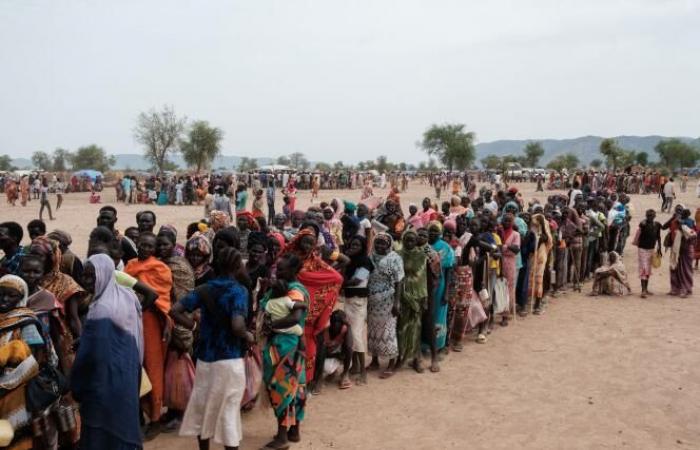Some 25.6 million people are facing “acute food insecurity” due to the conflict ravaging Sudan, a UN-backed report said on Thursday, June 27. This disaster therefore affects more than half of the population of this country in northeast Africa.
According to projections from the Integrated Food Security Phase Classification (IPC) report, on which the UN agencies base themselves, this figure includes “more than 750,000” Sudanese people faced with the « famine »the highest level of the IPC scale, defines as “a state of extreme food deprivation”. More than 8.5 million people are also in a situation of” emergency “the last step before starvation.
“For half the population of war-ravaged Sudan, every day is a struggle to feed themselves and their families”underlined in a joint press release the United Nations Children’s Fund (UNICEF), the Food and Agriculture Organization of the United Nations (FAO) and the World Food Program (WFP).
Since April 2023, a war has been going on between the army, led by General Abdel Fattah Al-Bourhane, and the paramilitary Rapid Support Forces (RSF) of his former deputy, General Mohammed Hamdan Daglo. It has caused tens of thousands of deaths and displaced more than nine million people, according to the UN. The IPC report specified that these “Fourteen months of conflict have plunged Sudan into the worst levels of food insecurity ever recorded by the IPC in the country”.
Read also | Article reserved for our subscribers In Sudan, the scorched earth strategy of General “Hemetti’s” paramilitaries
Add to your selections
“Risk of famine in fourteen areas” of Sudan
Both belligerents use “Hunger as a weapon of war”had also denounced, on the eve of the publication of the report, four UN special rapporteurs in a press release. They believe that the foreign governments that help them are complicit in “war crimes”These experts mentioned the siege of El-Fasher, the capital of the state of North Darfur, which escapes the FSR, which threatens hundreds of thousands of civilians who are prey to hunger and thirst.
Both sides have been accused of war crimes for deliberately targeting civilians, bombing populated areas and blocking humanitarian aid. Human rights groups and the United States have also accused the paramilitaries of ethnic cleansing and crimes against humanity.
It exists “a risk of famine in fourteen zones” Darfur (West), Kordofan (Southwest), Gezira (Central) and the capital Khartoum and its surroundings, according to the IPC. In these regions most affected by the conflict, “the situation is particularly critical for populations trapped by the war”the report said. “Critical levels of starvation, death, destitution and acute malnutrition are evident or at risk of becoming so,” he added.
Read the decryption | Article reserved for our subscribers Sudan torn apart by a year of war
Add to your selections
Access for humanitarian organizations to Sudan is ” insufficient “ and part of the population is at risk of ” to starve “, had already warned Filippo Grandi, the United Nations High Commissioner for Refugees (UNHCR), at the beginning of June. The NGO Doctors Without Borders (MSF) recently assured that the conflict has plunged the country into « [l’]one of the worst crises » humanitarian organizations in the world for decades.
Follow us on WhatsApp
Stay informed
Receive the essential African news on WhatsApp with the “Monde Afrique” channel
Join
In the areas most affected by the conflict, “sending money from abroad and local mutual aid systems”including the many pro-democracy groups that organize mutual aid in Sudan, “have contributed significantly to avoiding an even more serious deterioration in food security” populations, the IPC report said. Humanitarian agencies have long warned that only the difficulty of accessing data on the ground has prevented famine from being officially declared in Sudan.
“History has shown that by the time a famine is officially declared, people are already dying at a terrible rate.”, said Tjada D’Oyen McKenna, the general director of the NGO Mercy Corps. For Eddie Rowe, WFP director in Sudan, it is still possible “to avoid total famine” if the agencies benefit from a “unimpeded access” and adequate funding.







